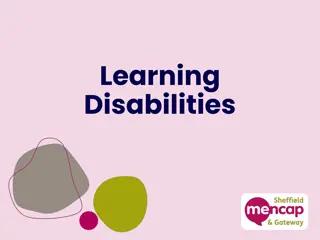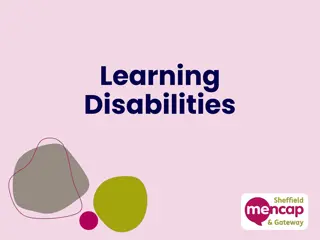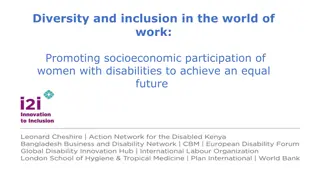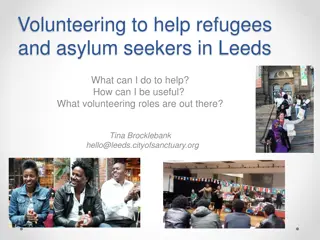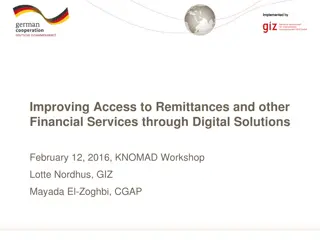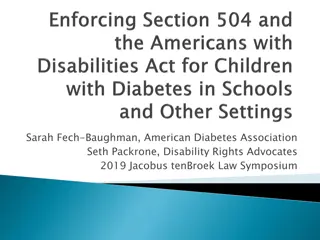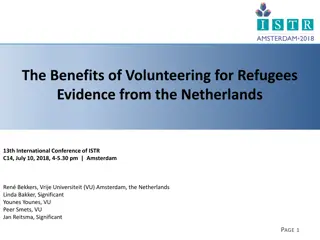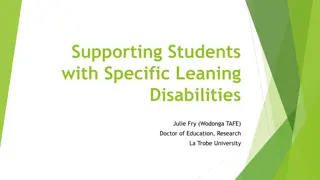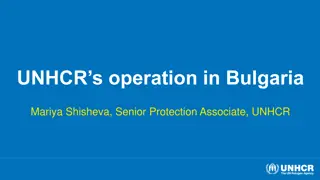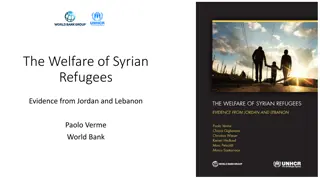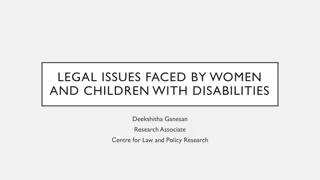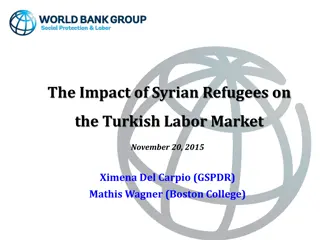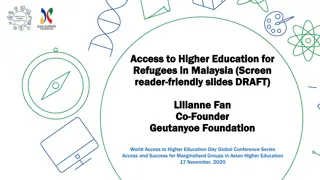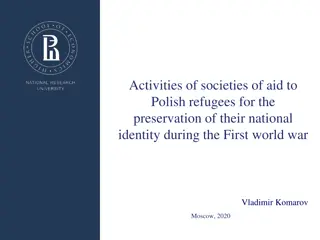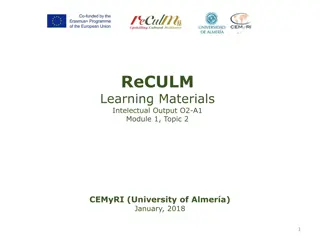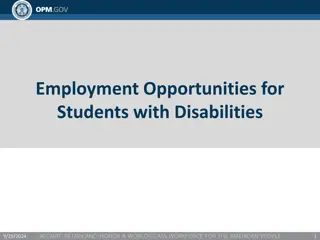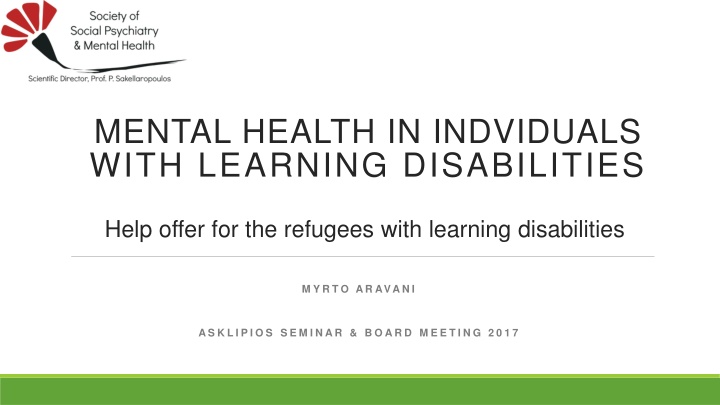
Supporting Refugees with Learning Disabilities: Mental Health Initiatives in Greece
Explore how Mental Health and Psychosocial Support projects in Greece are aiding refugees with learning disabilities to cope with anxiety, depression, and other challenges. Learn about the implementation of MHPSS principles and the crucial role of specialized staff in providing essential services for improved well-being.
Download Presentation

Please find below an Image/Link to download the presentation.
The content on the website is provided AS IS for your information and personal use only. It may not be sold, licensed, or shared on other websites without obtaining consent from the author. If you encounter any issues during the download, it is possible that the publisher has removed the file from their server.
You are allowed to download the files provided on this website for personal or commercial use, subject to the condition that they are used lawfully. All files are the property of their respective owners.
The content on the website is provided AS IS for your information and personal use only. It may not be sold, licensed, or shared on other websites without obtaining consent from the author.
E N D
Presentation Transcript
MENTAL HEALTH IN INDVIDUALS WITH LEARNING DISABILITIES Help offer for the refugees with learning disabilities M Y R TO AR AVA N I AS K L I P I O S S E M I N AR & B O AR D M E E T I N G 2 0 1 7
Refugees in Greece 1,2 milion of people who experienced armed conflicts and persecution have traveled through Greece, to gain a better life in Europe (Eurostat,2017), however: Closure of the Balkan Borders Implementation of EU-Turkey agreement in March 2016 Lack of specialized stuff to process asylum claims quickly
Refugees in Greece Syria Nigeria Afghanistan Guinea Iraq Ivory Coast Iran DRC-Democratic Republic of Congo Packistan Soudan
Refugees in Greece Anxiety/ fear/ worry sadness/ depression/ suicidal ideas Psychosomatic Behavioral Withdrawal Substance abuse Agressive behavior Hyperactivity Regression in development Headache Body pains Gastritis/stomach
Society of Social Psychiatry and Mental Health & International Rescue Committee for the refugees Implement MHPSS, a Mental Health and Psychosocial Support project in Emergency Settings. Basic principle: Interventions in early stage of emergency are essential in order to protect and improve people's mental health and psychosocial well-being.
MHPSS and its implementation Core principles: Human rights and equality Participation Do no harm Integrate support system Building on available resources and capacities
MHPSS and its implementation Staff: A Mixed Mobile Team of 11 persons, properly trained on MHPSS: 5 psychologists/ psychotherapists 1 social worker/ body-psychotherapist 1 speech and language therapist 1 art therapist 3 interpreters/ outreach officers (2 Arabic and 1 Farsi speaker) Duration of pilot phase: 6 weeks
MHPSS and its implementation Purposes: Psycho-education of adults Psychoeducation of children through special activities Counselling (individual, families)/ supportive services Community sensitization Networking
MHPSS and its implementation Place: Day Center for Refugees/Immigrants Khora Function over a year Initiation of a collective of individuals who used to work on Lesvos island Registered as a Greek co-operative Voluntary offer by a Spanish organization Non-hierarchically/ self-organized way of functioning and making decision procedure Different kind of services (food, legal services, dental services, childminding place and infants' care place, foreign languages and computer lessons)
MHPSS and its implementation Services: Individual and family counseling Psychoeducation in individual and groups (women) Special activities for children with purpose the arousal, expression and processing of emotions Stages/ steps: Training Observation Intervention / actions Closure of cases Evaluation
Case Study Structured 4 weeks activity Weekly -2 hours 5-15 years old Story telling Improvisation Narration Drawing
Case Study 8 years old Syrian boy / Observations: Withdrawal Playing alone the cards Communication only with his older brother (14 years old), usually by expressing anger/ significantly attached with him Slight speech difficulty Hyper-arousal
Case Study Social and Medical History 6 members family (2 brothers twins 14 years old, a sister 11 years old, he is the youngest) Living in an apartment that his parents rent with an NGO's help Being in Greece almost a year He is always like this He had stayed at our mothers belly, more than he should, without water inside
Which the diagnosis could be? Version 1 / Learning Disabilities ...is a general term that refer to a heterogeneous group of disorders manifested by significant difficulties in acquisition and use of listening, speaking, reading, writing, reasoning or mathematical abilities. These disorders are intrinsic to the individual, presumed to be due to central nervous system dysfunction....Problems in self-regulatory behaviors, social perception and interaction may exist with learning disabilities....Although learning disabilities may occur concomitantly with other handicapping conditions....or with extrinsic influences (such as cultural differences, insufficient or inappropriate instruction), they are not the result of those conditions or influences. National Joint Committee on Learning Disabilities (1990)
Which the diagnosis could be? ....is a term that describes a range of difficulties or disorders, that emerged among school age children, which can be related with significant problems in oral and writing expression, reading or/and mathematical skills, while usually come with emotional or behavioral disorders. (Gillberg & Soderstrom, 2003. Gillberg, Rsmussen, Kadesjo, Soderstrom, Rastam, Johnson, Rothenberger & Niklasson, 2004)
Which the diagnosis could be? Learning disabilities: Heterogeneity Primordial disorder Intrinsic Divergence between intellectual capacity and academic outstanding Co-existence with other difficulties or disorders
Which the diagnosis could be? Evaluation and final diagnosis of Learning Disabilities is based on : Complete intake from family environment Complete intake from school environment Systematic research and educational and psychological evaluation of the student by an interdisciplinary group of expertise staff
Which the diagnosis could be? Thoughts about the case: Stable enough family environment School environment Complete child's and family's medical history Child's brain condition after his birth Child's mental health condition before leaving Syria and afterwards
Which the diagnosis could be? Version 2 / PTSD Hyper-amnesia/ hyper-activity Physic numbing/ avoidance/ amnesia/ anhedonia Bessel val der Kolk,MD, 1994 Wetting the bed, after having learn to use the toilet Forgetting how to or being unable to talk Acting out the scary event during playtime Being unusually clingy with a parent or other adult National Institute of Mental Health, 2016
Which the diagnosis could be? Acculturation: affects intensely person's different mental processes (self-consciousness, perception of the environment, national identity, ethics, behavior ect) All the difficulties and conflicts that experience acculturated people, in the context of their estimation for the acculturation procedure, cause acculturative stress. That refers to a kind of significant psycho-social stress. Berry,1997
Intervention Suggested Connection/ cooperation with the parents Family's interconnection with the schools of their neighborhood Regular coordination between psychotherapists and teachers Family's interconnection with Medical Pediatricians in order the pathological/ neurological factor to be excluded or validated
Reflections Planning of a cohesive/ transnational Social Policy Detailed strategy/ methodology for Diagnostic criteria Therapeutical intervention among refugee population Properly trained interpreters
Thank you for your attention!

